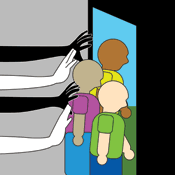Wednesday, November 10, 2010
Deborah Edmonson, a parent attending a Nov. 4 legislative hearing on Medicaid, said the state rejected her Down syndrome daughter for aid, even though the U.S. Department of Disability Services guidelines say she qualifies.
"Medicaid rejected us, saying (my daughter) Taylor requires no more work than a regular baby, but she requires physical therapy and speech therapy once a week. She has an endocrinologist, an ear doctor, an eye doctor and needs a cardiologist," Edmonson said. "When she was born, they had to untwist her intestines and connect her divided pancreas. We owe $10,000 worth of doctor bills, even with insurance, and we have no idea how much longer the insurance company will stay with us. How can they say she doesn't meet the eligibility requirement?"
Legislators scheduled the hearing specifically to address what they considered Medicaid's two-year uptick in dropping formerly Medicaid-eligible kids. Mississippi Senate Public Health Committee Chairman Hob Bryan, D-Amory, said the state Division of Medicaid is too focused on containing spending and is consequently booting Medicaid-eligible children from state and federal aid.
"The goal of the ... administration is to contain spending," Bryan told about 40 attendees of a legislative hearing investigating the Mississippi Division of Medicaid's process for removing formerly Medicaid-eligible children. "To remove children needing treatment—this situation is described as a success by this administration."
Bryan joined House Public Health Committee Chairman Steve Holland, D-Plantersville, and other Public Health Committee members in grilling Medicaid officials.
Former President Ronald Reagan created the Katie Beckett Medicaid program in 1981 to provide home services for disabled children in response to a lawsuit filed by Katie Beckett's parents in Iowa. The parents sought government services to pay for home therapy rather than more expensive institutionalized health care. Prior to the 1980s, many handicapped children and children with Down syndrome could not get government aid to finance therapy unless they were institutionalized.
The Katie Beckett Medicaid program, handled through Mississippi's Disabled Children Living at Home program, allows states to waive parents' traditional Medicaid income requirements to qualify their children for government-assisted therapy. Most families must be at poverty level to qualify for government health care for their children, but the waivers extend to middle-income parents specifically for health-care costs related to a child's disability. The program does not qualify the parents for Supplemental Security Income. States handle the funds differently, but Bryan and Holland say the program is subject to the whim of administrators, and want more review of the process by which Medicaid officials remove formerly eligible children.
The program currently serves about 1,200 children, but parents and Mississippi Coalition for Citizens with Disabilities Director Mary Troupe complain that the Mississippi Division of Medicaid is refusing service for many children who should rightfully qualify for aid under federal standards, and is abruptly cancelling service for people who have been in the program for years.
Holland, after months of receiving complaints from newly booted parents, said that the Division of Medicaid had recently begun to "screw the lid down" on beneficiaries.
Richard Robertson, legal counsel for the Division of Medicaid, said the state is following federal guidelines, which mandate that the beneficiary be eligible for Medicaid for institutional care, and who are receiving, while living at home, medical care that would be provided in a medical institution.
"Most of the rub has been in that determination that the child needs an institutional level of care," Robertson told committee members, explaining that Medicaid-
contracted doctors are finding more cases where the children—many of them with Down syndrome—are not suffering serious enough disabilities to be eligible for institutional care.
Rep. Cecil Brown, D-Jackson, asked if the Medicaid-contracted physicians recommending the removal of children had personally examined the children before removing them as beneficiaries. "Are they examining the child or basing their information upon records?" he asked.
Robertson said the department usually conducts the appeal hearing by phone, and said no physician personally inspects the child: "Do we have a doctor examine the child? No, that's not going on."
Holland argued that Medicaid was using the opinion of bureaucrats against the recommendations of family doctors.
"You've got paper shufflers basically doing the appeals process where there should be a medical review," Holland said. "We're going to talk about your appeals process, believe you me, come Jan. 4."
Troupe attended the hearing, and demanded the Division of Medicaid provide parents and their doctors with a specific list of eligibility requirements, perhaps based upon the amount of care and health-care costs the child requires. She said the state needed to be clear about what kind of disability was eligible for institutional care.
Medicaid Committee Chairman Kirk Dedeaux, D-Perkinston, said legislators would be looking to pass laws that would put the appeals process at Medicaid under an independent party, among other possibilities, to promote fairness during the appeal.

Comments
Use the comment form below to begin a discussion about this content.
Sign in to comment
Or login with:
OpenID